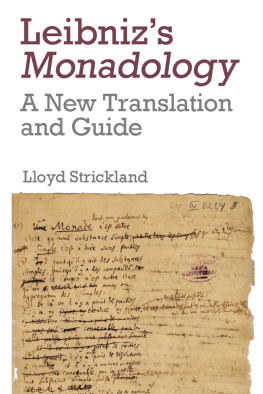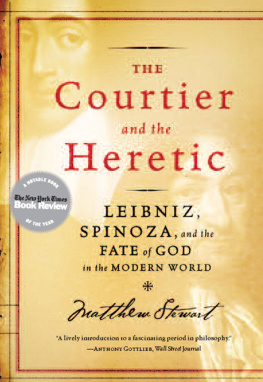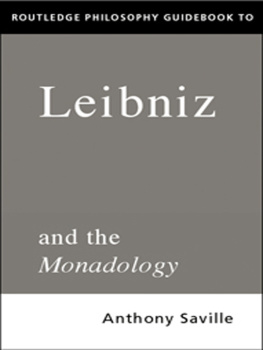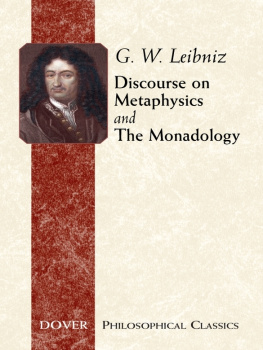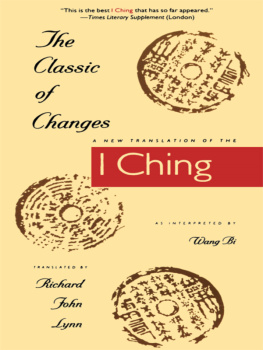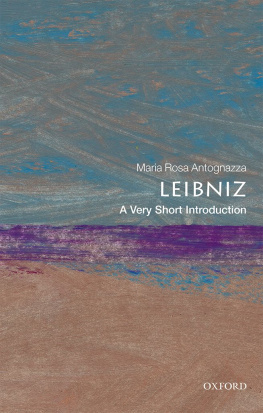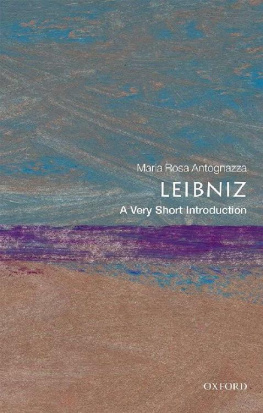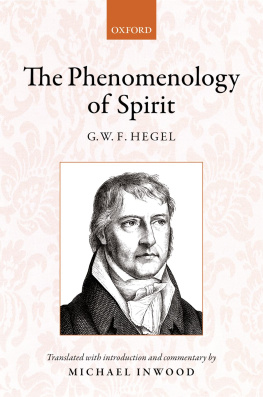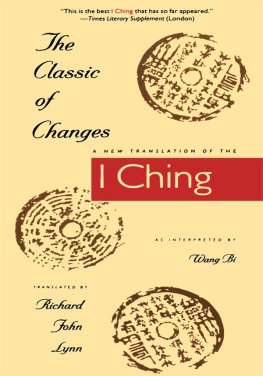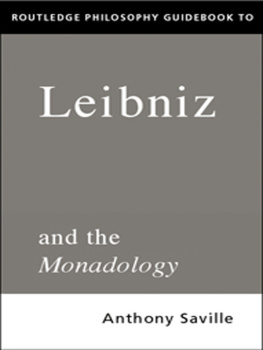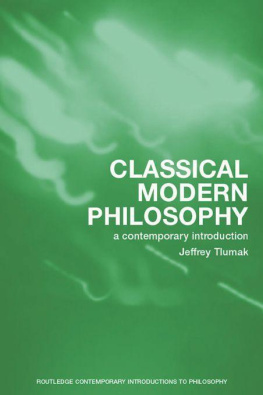Leibnizs
Monadology
A New Translation and Guide

LLOYD STRICKLAND
EDINBURGH
University Press
For Dan Cook and Vernon Pratt,
for all of the help and support over the years: thank you
Lloyd Strickland, 2014
Edinburgh University Press Ltd
The Tun - Holyrood Road, 12(2f) Jacksons Entry, Edinburgh EH8 8PJ
www.euppublishing.com
Typeset in 11/13pt Ehrhardt MT Pro by
Servis Filmsetting Ltd, Stockport, Cheshire
and printed and bound in Great Britain by
CPI Group (UK) Ltd, Croydon CR0 4YY
A CIP record for this book is available from the British Library
ISBN 978 0 7486 9321 4 (hardback)
ISBN 978 0 7486 9323 8 (webready PDF)
ISBN 978 0 7486 9322 1 (paperback)
ISBN 978 0 7486 9324 5 (epub)
The right of Lloyd Strickland to be identified as Author of this work has been asserted in accordance with the Copyright, Designs and Patents Act 1988, and the Copyright and Related Rights Regulations 2003 (SI No. 2498).
Contents
Acknowledgements
I would like to extend my warmest thanks to an anonymous reviewer for Edinburgh University Press for feedback on the entire manuscript.
Parts of the commentary were incorporated into a talk given to members of the Oxford Philosophical Society in November 2013. I would like to thank everyone present for their comments, and especially Julia Weckend for her insightful discussion on a number of topics, and for feedback on parts of the commentary.
A draft of the whole commentary was used as the basis of discussion for a reading group on monadologies at the University of Edinburgh in January and February 2014. The feedback I received was very helpful, and I would like to thank the members of that group for their careful reading of the commentary: Reiko Goto-Collins, Emily Brady, Anna Ortin, Brian Smith, James Henry Collin, Peter Fosl, Alasdair Isaac, Jeremy Dunham, and Pauline Phemister.
My thanks are also due to Daniel J. Cook for helpful feedback on a draft of the introductory essay, and to R. R. Rockingham-Gill for comments and guidance on the Structure of the Monadology.
Thanks also to Sean Greenberg and R. C. Sleigh Jr, who allowed me to consult a draft of parts of their new translation of the Theodicy (forthcoming with the Oxford University Press). The exercise of comparing their translation with mine was very beneficial, and allowed me to improve my translation of some of the sections of the Theodicy included in this volume.
I acknowledge with gratitude the permission granted by the Gottfried Wilhelm Leibniz Bibliothek, Hanover, to use a scan of the first page of the manuscript of the Monadology on the cover of this volume.
At Edinburgh University Press, I would like to thank Carol MacDonald, who commissioned the project, and Rebecca Mackenzie, who managed it, and Michelle Houston. Thanks also to Tim Clark, who copy edited the typescript.
Key
In the translation of the Monadology and the Principles of Nature and Grace, text enclosed within square brackets [... ] was present in one or more of the earlier drafts, but subsequently deleted. I have not indicated all of Leibnizs deletions, only those likely to be of philosophical interest.
In the commentary, when referring to translated material contained within this volume, the following abbreviations are used:
| M | = | Monadology (for example, M35 = section 35 of the Monadology) |
| PNG | = | Principles of Nature and Grace (for example, PNG4 = section 4 of Principles of Nature and Grace) |
| T | = | Theodicy (for example, T189 = section 189 of the Theodicy) |
References to the Appendix on Monads are given simply by citing the relevant page number of this volume.
Abbreviations
In the notes, commonly cited editions of Leibnizs writings are referred to using the following conventions:
| A | = | Smtliche Schriften und Briefe, ed. Deutsche Akademie der Wissenschaften, 8 series, each divided into multiple volumes (Berlin: Akademie Verlag, 1923). |
| DSR | = | De summa rerum, trans. and ed. G. H. R. Parkinson (New Haven: Yale University Press, 1992). |
| G | = | Die Philosophischen Schriften, ed. C. I. Gerhardt, 7 vols (Hildesheim: Georg Olms, 1978). |
| H | = | Theodicy, trans. E. M. Huggard (Chicago: Open Court, 1990). |
| LDB | = | The Leibniz-Des Bosses Correspondence, trans. and ed. Brandon Look and Donald Rutherford (New Haven: Yale University Press, 2007). |
| LDV | = | The Leibniz-de Volder Correspondence, trans. and ed. Paul Lodge (New Haven: Yale University Press, 2013). |
| LNS | = | Leibnizs New System and Associated Contemporary Texts, trans. and ed. R. S. Woolhouse and Richard Francks (Oxford: Oxford University Press, 1997). |
| LPW | = | Philosophical Writings, trans. and ed. Mary Morris and G. H. R. Parkinson (London: Everyman, 1973). |
| LTS | = | Leibniz and the Two Sophies, trans. and ed. Lloyd Strickland (Toronto: CRRS, 2011). |
| NE | = | New Essays on Human Understanding, 2nd edn, trans. and ed. Jonathan Bennett and Peter Remnant (Cambridge: Cambridge University Press, 1996). |
| MPE | = | Monadology and Other Philosophical Essays, trans. and ed. Paul Schrecker and Anne Martin Schrecker (Indianapolis: Bobbs-Merrill, 1965). |
| MPW | = | The Monadology and Other Philosophical Writings, trans. and ed. Robert Latta (Oxford: Clarendon Press, 1898). |
| PE | = | Philosophical Essays, trans. Roger Ariew and Daniel Garber (Indianapolis: Hackett, 1989). |
| PPL | = | Philosophical Papers and Letters, trans. and ed. Leroy Loemker, 2nd edn (Dordrecht: D. Reidel, 1969). |
| SLT | = | Shorter Leibniz Texts, trans. and ed. Lloyd Strickland (London: Continuum, 2006). |
| TI | = | Textes indits, ed. Gaston Grua, 2 volumes with successive pagination (Paris: Presses Universitaires de France, 1948). |
Introduction
Few works of philosophy can rival Leibnizs Monadology in terms of sweep: it begins with an account of the most basic substances, monads, and ends with Gods intimate relation to the most exalted of these substances, namely minds, and in between it covers (among other things) the natures of perception, sensation, and thought, the principles of reasoning, the existence and nature of God, the creation of the best possible world, and the organic structure of bodies. In covering all of this ground, and more, not only does the Monadology seek to present many of the key elements of Leibnizs mature philosophy and mount a defence of them, it does so in the space of ninety short sections, amounting to approximately 6,000 words. It is difficult not be struck by both its scope and its size, and in particular the apparent disparity between the two. In the entire history of philosophy there is little else like it. Great philosophers, as a rule, have sought to present their thought to the public through the medium of books, often ones of great length: think of Platos Republic

